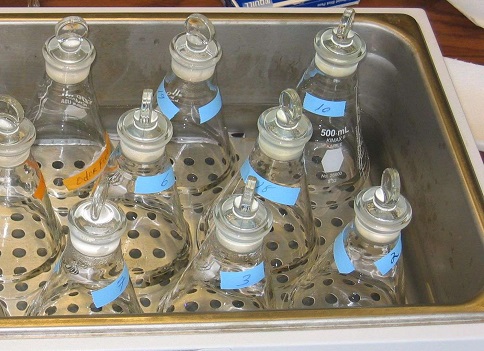

Philadelphia Water's BLS tasters prepare beakers of water for sampling. The warn water bath helps draw out delicate flavors that could otherwise go unnoticed. Credit: Bureau of Laboratory Services.
I came of drinking age during a time when now-extinct macrobrewers like Schmidt’s Brewery and Ortlieb Brewing in Northern Liberties ruled local taprooms. It was also a time when our tap water was derisively called “Chlorine Cocktail” or “Schuylkill Punch” (incidentally, now the name of a brew offered by Manayunk Brewing Co.).
Today, Philly Beer Week celebrates the rebirth of local breweries making a variety of good tasting beers, and a highly respected Philadelphia Water is turning out a better tasting tap water.
Believe it or not, those two trends—better tasting beer and better tasting water—are related.
Philadelphia Water has an extensive environmental laboratory to ensure you’re getting water that’s safe and tasty. But, despite the expensive laboratory instruments, we still need human senses for tasting and smelling. While instruments detect individual chemicals and tell us their concentrations, they can’t tell us how they form flavor when they are all mixed together. It’s a little known fact, but pure water doesn’t taste very good. Good tasting water has a mixture of minerals and carbonates. Good tasting water has a recipe. But water isn’t supposed to smell; just a touch of chlorine, necessary for safety. Beer, on the other hand, has hundreds of chemicals that meld to create a nearly endless spectrum of desirable flavors.
Many breweries employ expert tasters who are trained to sample their beer during different stages of fermentation and detect any off flavors. And here at Philadelphia Water, we took notice and followed their example.
Today we do what breweries do—we check for off flavors using both lab equipment and human tasters trained to look for off flavors.
We learned from the experts who taste beer, wine and food. We trained chemists, biologists and technicians to taste and smell our water. We learned how to dissect a glass of water into its different tastes and smells. We identified the off flavors, and then worked to get rid of them. Philadelphia’s tap water is now more consistent and milder in flavor.
That effort, combined with far superior protection of our source water from pollution, really has helped us come up with a better recipe for our water, and we are happy to say goodbye to that old Chlorine Cocktail. In fact, our water now tastes so good, we think it’s an essential part of enjoying good beer. Keep a chilled glass of tap water on the table during Philly Beer Week, and it’ll refresh your palate between brews as you sample Philly’s amazing fermented offerings.
So, if you’re celebrating Philly Beer Week, raise a glass of tap water along with your beer and say cheers to America’s best beer (and water) drinking city!
More on Philadelphia, Water and Beer:
Our Beer History: It All Started with the Water
Both water and beer were important in the settling of our city. William Penn chose to settle between the Delaware and Schuylkill rivers because of the abundance of fresh water—perfect for drinking, fishing, traveling, and of course, brewing. He made sure he had his own brewhouse along the Delaware, and encouraged the establishment of brewhouses for the good citizens of Philadelphia. By the 1800s, brewhouses dotted the Schuylkill watershed, discharging their waste into the streams. Brewerytown, just east of the Schuylkill’s banks, got its name for a good reason, but neighborhoods like Kensington could have also easily stolen the moniker. At its peak, Philadelphia had over 100 breweries, and our beer was famous around the country. A big reason for that was the quality of our water and its mineral makeup, an essential ingredient for quality beer. For more on that, read this article on our water's profile and how it impacts brewing and baking.
BEER TASTING FACT: It’s (Mostly) in the Nose
Did you know that you smell your water or beer when you drink it?
In order to do the job of providing great tasting water, Philadelphia Water’s tasters had to learn how their senses work. We all have what’s known as a “retronasal passage” connecting our noses to our palates, and it is smell that actually gives beer and water much of its flavor. When you consume beer or water you release aromas in your mouth, which then travel up the retronasal passageway to your nose. You smell the chlorine in the tap water. You smell the chocolate, caramel, malty aromas of your beer. So, if you want to avoid the flavor of your water or beer, keep it icy cold—aromas arise more from warmer liquids.
Our water tasters learned that some flavors that make water taste off actually make foods and other beverages tasty. A hot water heater can sometimes produce a rotten egg odor from hydrogen sulfide. Groundwater in some places, such as parts of Florida, smells like a burnt match because of the presence of sulfides. These are undesirable taints for tap water. But they belong in beer! The telltale smell of the seashore is in part due to sulfur chemicals. The same are important for beer’s flavor. But beer with too much of the sulfur smell creates that notorious “skunked beer” flavor.
_________________________________________________________
Gary A. Burlingame, BCES, is a water quality expert and laboratory director for Philadelphia Water. He has a BS/MS in Environmental Science from Drexel University with more than 35 years of experience in the science of water. He was once offered a chance to become a brewmaster and beer executive. But he chose water instead. Nevertheless, he greatly enjoys a slightly chilled craft beer after a hard day’s work.